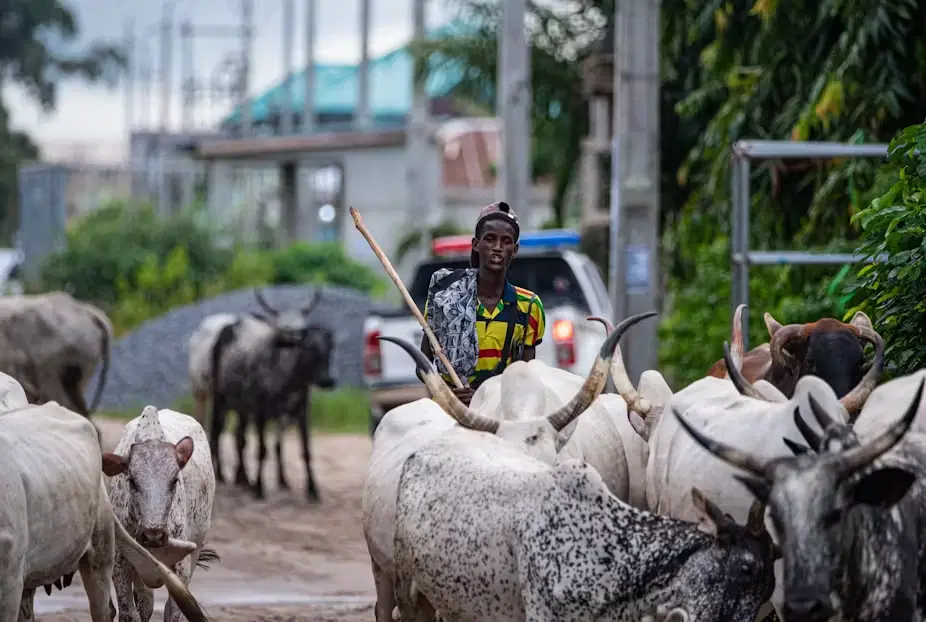604
By Daniel Adaji
Open grazing is no longer viable for Nigeria’s livestock sector, the Minister of Livestock Development, Idi Maiha, has declared, insisting that ranching is the sustainable path to peace, food security, and productivity.
Maiha stated this during a two-day media retreat organised by the ministry in Kaduna recently, where he showcased his Zaidi Farms to journalists. He stressed that ranching offered a long-term solution to herders-farmers clashes across the country.
“This is a typical pasture farm and this is where you require one of typical ranch to keep animals away from roaming the countryside. This would give you a huge advantage. So when you are talking about ranching, this is ranching,” he said.
The minister cautioned that ranching requires a gradual process. “Yes, ranching should be done and we know that today’s open grazing is not sustainable into the future. But it’s not something that you can switch on and off. There is a process of ranching. You have to have the land. You also have to cultivate this land with pasture, minimum of two years establishment before you bring animals. So that is the procedure.”
Drawing from personal experience, Maiha said ranching works in practice. “I have been here, like I said, for 17 years. I started this farm in 2005. And since I established my pasture field, my animals have not been grazing in the wild. Dry season, rainy season, I have sufficient grass for my animals. And this is the picture we want to replicate across the country going forward.”
He linked the initiative to President Bola Tinubu’s Renewed Hope Agenda. “Under the President’s Renewed Hope agenda, the livestock component is preaching what we are seeing here today inside the farms. And we do believe that with the gains we have so far made, at the level of the state government, at the level of the private sector participation, we are on track. This is the trajectory. This is where we are going to.”
The Federal Ministry of Livestock Development has also reaffirmed its commitment to end open grazing by accelerating the development of three grazing reserves in Abuja as models for nationwide adoption. Maiha assured that “all animals roaming the city centres will be relocated to designated reserves.”
According to him, “We are not unveiling this plan for the first time. It has been a consistent policy direction of this administration, but now we are entering the stage of implementation. Developing grazing reserves will enable us to reduce the practice of open grazing, enhance productivity, and minimise conflicts between farmers and herders.”
He added: “Our countryside should have milk trucks, not armoured vehicles; milking machines should replace machine guns.” The initiative is part of the National Livestock Growth Acceleration Strategy (NL-GAS) aimed at promoting peace, food security, and rural prosperity.
Maiha highlighted how pasture production guarantees reliable feed supply. “One outstanding factor here, it has the biomass. If you are able to regrow this field, in a year, you can get 300 and 50 tons per hectare. And at every 45 days, you can harvest. So you can see it has huge advantages. But most people, when you tell them to go into practical production, they think about the cost outlay. They don’t look at the benefits,” he said.
He noted that different grasses such as Napier, bracharia, marandu, and mombasa were already being cultivated and should be transplanted across grazing reserves. “This is one important component that should be transplanted in every grazing reserve that we have in this country. And we will start doing it. Let us start planting grasses. Just like you grow corn, you grow maize, you grow wheat, you grow beans, for human beans,” he said.
On feed preservation, Maiha explained: “Today we are harvesting, we are chopping and feeding animals. But by October, all these that you have seen here will be chopped and turned into silage. Then we can use it throughout the dry season. In addition to this, we also cut these smaller ones and make them into hay.”
For him, livestock production must be scientific. “This is pure science. For the total land area I have, I can calculate the stocking density. I know what my animals will eat, depending on their reproductive stage. So this is what we are saying and it can be done. No need to invent the wheel.”
He added: “And we believe this is the future of livestock in this country. For both dairy farm and ranching, I mean, and beef breed and small animals, this is the way to go.”
At the retreat, experts including Dr. Cletus Akwaya, Peter Dama, Dr. Ishaq Bello, and Oluseun Taylor engaged participants on ethical reporting, development communication, the livestock value chain, and the role of digital media in agricultural journalism. A field visit to Zaidi Farms gave participants firsthand insight into ranching practices, as the ministry pledged continued collaboration with the media in shaping public discourse and policy.



